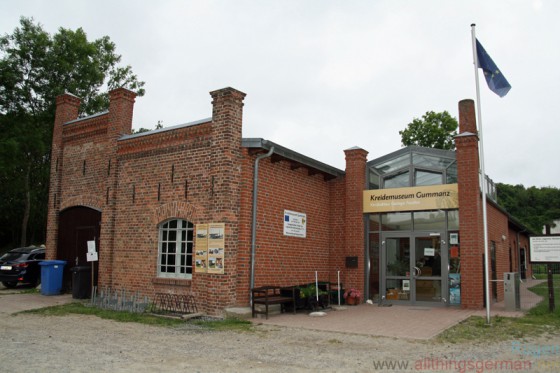The Heilig-Geist church in Oberursel not only welcomes chalk drawings by children on their forecourt, they even provide the chalk in their public book exchange:
Rügen’s Chalk Museum (Kreidemuseum)
Located at the end of a small track that leads past the Precise Resort (formerly Jasmer Resort) in Sagard on Rügen is what is apparently Europe’s only museum dedicated to chalk.
The chalk museum or “Kreidemuseum” is located in the factory building of the Chalk Factory in a hamlet called Gummanz that was in use up to 1962. It was re-opened as a museum in 2005 using a grant from the European Agricultural Fund and the European Fund for Regional Development, and has also been extended.

The entrance to the chalk museum (Kreidemuseum) in Gummanz
Straßenkreide – Pavement Chalk
A popular pastime during the summer months for children in Germany is to create works of art on the pavements outside their houses – with coloured chalk.

A chalk pavement picture
At this time of year, shops such as our local newsagents sell the large pieces of chalk in buckets of assorted colours, and it is not unusual for the children to decorate not only the pavement but also parking spaces and sometimes even entire roads if they are private ones.
But whilst this may be seen as harmless in Germany, the pictures are obviously washed away with the next rainfall, other countries take a different view. I have read about cases involving the police and other officials in the USA, Wales and Scotland, each with either people being fined or threatened with such action.
In Germany, on the other hand, there was even a court case last year where the judge decided that drawing with pavement chalks could be considered “normal use”. Some towns such as Geldern even have pavement picture contests.
It strikes me as strange, that something that children are encouraged to do in one country, can cause such a problem in another.
But perhaps the underlying German attitude to pavements and property is part of the reason. German tenants and property owners are responsible for not only their own piece of land, but also for the public pavement that it borders with. Hence they sweep it most weeks and even legally obliged to clear it of snow and ice in the winter.
This is definitely a case of andere Länder andere Sitten.


